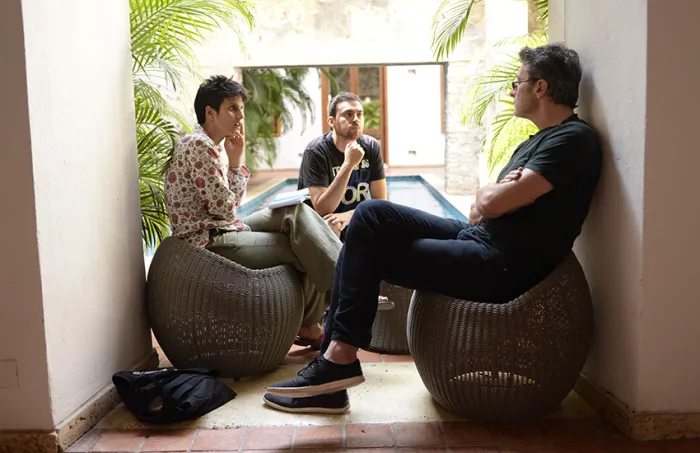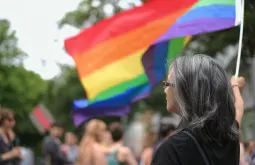Stories we share

In some African tribes children carry their given name till they come of age. Then, they rename themselves, and go forth with a new identity. “From ages 20-26 you become your own in the world,” says Patrick Alexander, who begins his co-directed documentary Parador Húngaro (Hungarian Foodstall) by playing with his name. Claiming a place as one’s own, like renaming oneself, is an act of staking one’s identity in the world. Patrick Alexander chose an approximately Hungarian identity: he became Sándor Patrick.
“Patrick is very playful with his identity,” says co-director Aysenet Suárez Ruiz, also Alexander’s wife. Which is why when he arrives in Colombia, Alexander identifies himself as Hungarian. Coming across the Hungarian foodstall and its owner Gyuri Villás, a septuagenarian who despite 50 years of living in Bogotá still claims to be Hungarian, is a form of homecoming.
Encountering a new place is an omnivorous experience. “You eat it,” says Alexander, “You want to taste everything; you want to try everything. You can only feel that enthusiasm the first time when everything is fresh. You want to learn the language, the music, everything.”
The taste of Hungarian food and fruity brandy called ‘palinka’ was like “finding an ancient part of yourself,” says Alexander, “It was like I was supposed to eat this food, and drink this drink.” No wonder then that he develops an easy affinity for the Hungarian food-stall owner who brews his own mango palinka. Referring to Gyuri with the suffix “bácsi” or uncle, Alexander says talking to the Hungarian in Colombia was like meeting an uncle or a grandfather.
Perhaps it was another ‘ancient part of oneself’ that the erstwhile soldier evoked in Alexander who travelled to Germany twice as a child due to his father’s military posting. “Gyuri was a living testament of history,” says Alexander. Born in 1935, Gyuri left Hungary in 1957. “Their Hungary was one of war, poverty, Stalinism, and of opposition against Russia. My Hungary was one from 1990-2000.” Arriving in Hungary, Alexander relished being at one of the strongholds of communist ideology. He confesses to a continued “nostalgia for the propaganda of the other side.”
Growing up in Germany, Alexander developed a curiosity about everything on the other side of the Berlin Wall. “In school they had a map where all of Eastern Europe had one colour,” he recalls, “I always wanted to fill in that one space.” The ‘other’ became that space on the map for Alexander, and every new country an opportunity to redefine his self.
Alexander’s inner nomad has a complex affinity for Gyuri, who had not taken a trip even within Colombia in 50 years. Perhaps this passage in the film best describes it:
With Gyuri it was like we’d met on the road, but going different directions. And even at different times. Perhaps we saw something of ourselves in each other, not just the similarities, but the differences; the what-ifs and the could-have-beens.
The scene sees the two on opposite sides of a table playing ping-pong, until the ball falls off. We see them from behind as they lean longingly over the balcony from where they cannot reach the ball.
“I was curious about his story, his experience,” says Alexander, “I wanted to let him tell his story, for this to be a biography of him.” While Alexander engages in Gyuri’s story, another perspective also informs this encounter.
“I knew for a fact that the heart of the film is Patrick,” says Aysenet Suárez Ruiz. “The film becomes alive when he becomes part of it,” says the co-director who found it a challenge to make Alexander realize the same.
Beyond being an interesting subject, documenting Alexander’s experience was an “ethical question” for Ruiz. “You cannot make another person naked and you yourself not be naked, too,” she says. Off-screen too, Ruiz identified in Alexander’s palate a “culinary nostalgia,” urging him to probe deeper for its source. Midway through the film, Ruiz’ presence as director is palpable, as we hear Alexander’s diatribe while packing for his trip to Hungary.
In helping Alexander reconnect to a ‘deeper nostalgia,’ Ruiz too finds certain undiscovered connections. “One night I dreamed of when I was little and my Mom travelled with me through Bogotá. I really enjoyed those moments,” she says, recalling her itinerant past in the interview, “I really enjoy that now.”
Ruiz documents Alexander with the same curiosity with which he looks at Gyuri bácsi. In revealing the others story, they are expose their own identities. Maybe that is the joy of discovery: through others’ stories, one finds a way to better tell one’s own.






